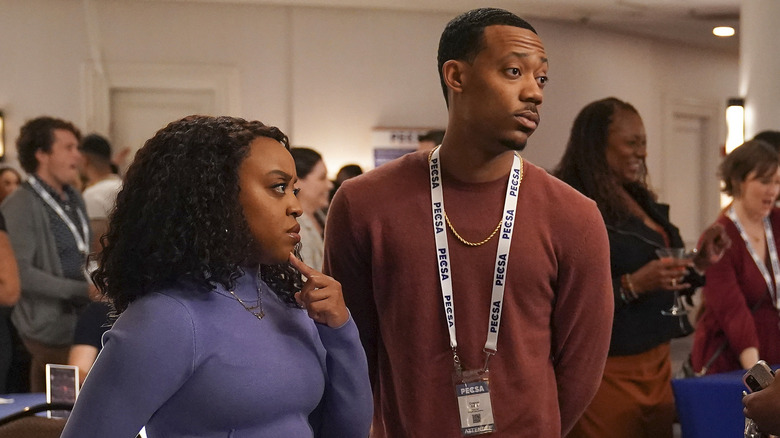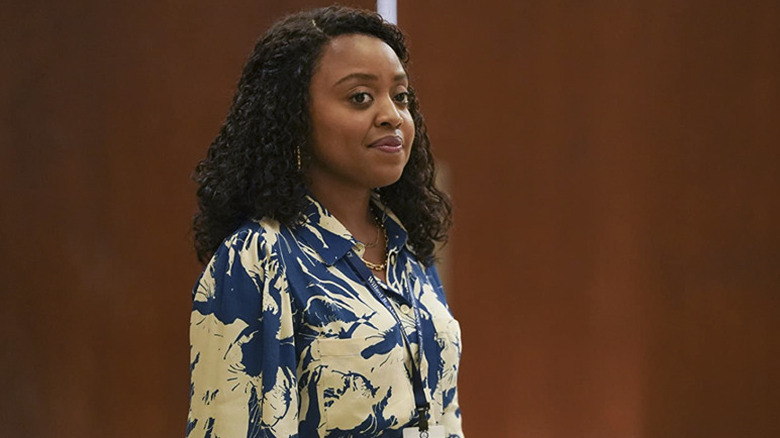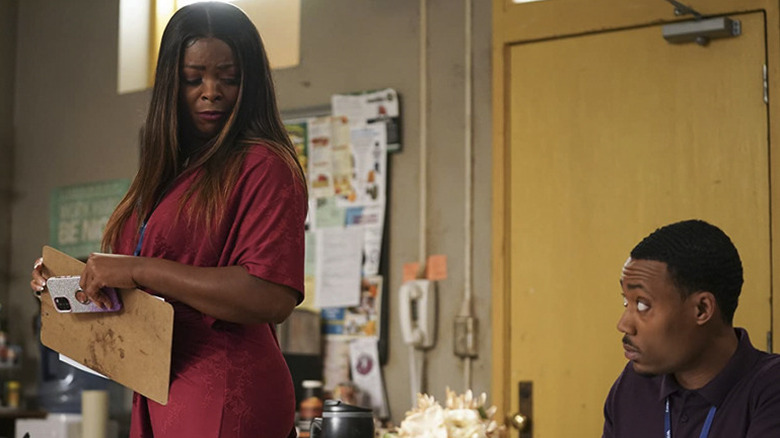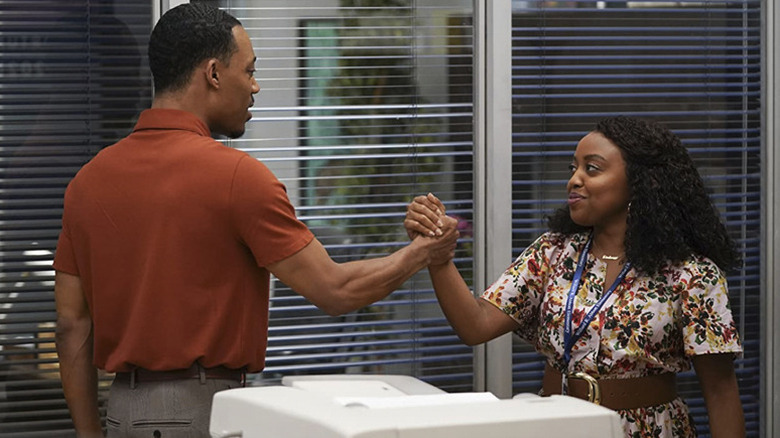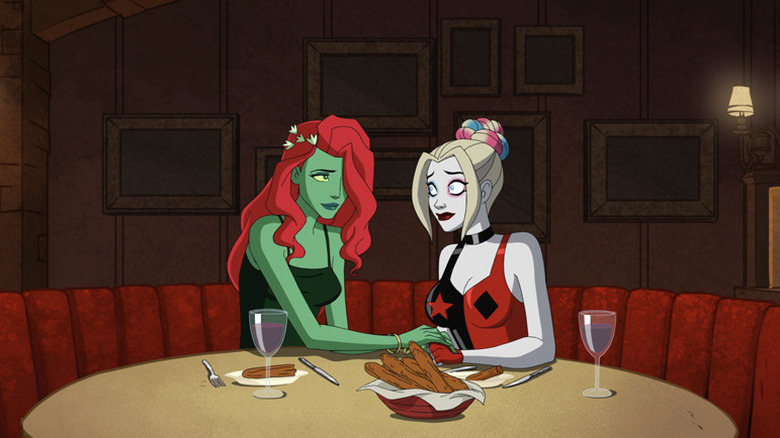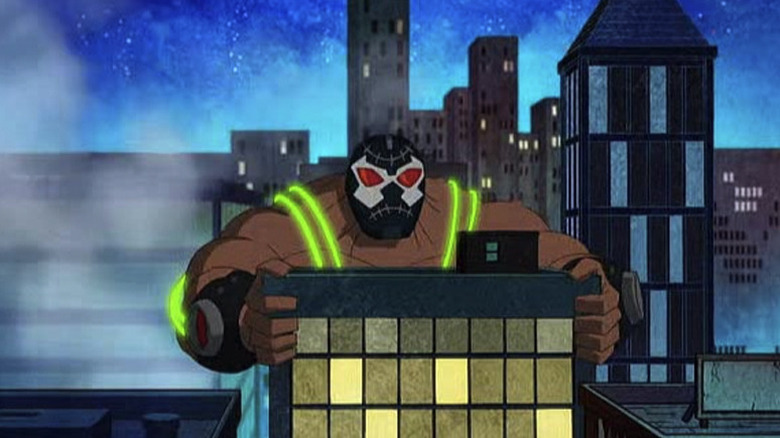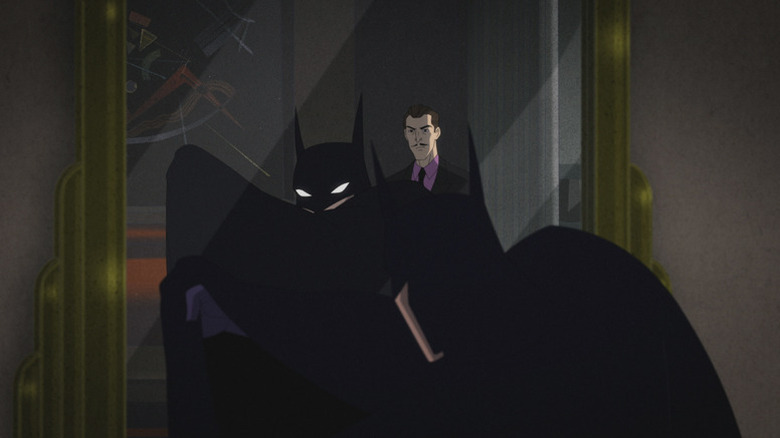Justin Halpern And Patrick Schumacker On Abbott Elementary And Harley Quinn's Valentine's Special [Exclusive Interview]
This post contains spoilers for season 3 of "Harley Quinn."
Justin Halpern and Patrick Schumacker are two of the key creative voices behind two of my favorite shows on TV right now, "Abbott Elementary" and "Harley Quinn." At first glance, those projects may seem like polar opposites of each another: One is an incredibly charming network sitcom, and the other is an ultra-violent, R-rated animated series set in the world of DC Comics. But the primary element they share (aside from a terrific sense of humor) is a palpable care for its characters; the writer-producer-showrunners make sure to give everyone relatable emotional stakes, even if they're sometimes operating in a heightened comedic environment. (Halpern and Schumacker co-showrun "Abbott Elementary" with star and creator Quinta Brunson, and they've been the showrunners of "Harley Quinn" for its first three seasons; they're preparing to pass the torch to writer-producer Sarah Peters for season 4 and beyond.)
This week, I had the pleasure of having a long discussion with Halpern and Schumacker about both shows. We spoke about the newly released "Harley Quinn" Valentine's Day special, the "will they, won't they" story arc between Janine and Gregory on "Abbott," the episode idea they have not been able to crack yet, season 4 of "Harley Quinn," and more.
Note: This interview has been lightly edited for clarity and brevity.
'No one is a bigger fan of television than Quinta Brunson'
What was it about Quinta Brunson that made you guys say, "I need to sign up for whatever this genius is making"? What was your first impression of talking with her?
Halpern: Well, we had cast Quinta in a pilot five years ago, a CW pilot. And we were looking for someone to play this role of a Valley Girl who lives in San Fernando Valley and is a little ditzy. And Quinta came in and read, and obviously does not give off that at all. She gives off the complete opposite. And she came in and it was like she had just come from the gym, and I think she'd gotten the call 10 minutes before, and she came in and immediately he and I were like, "F*** what we wrote, this person is amazing." And we were like, "Oh my God, we discovered this new person." And then, everybody under 30 was like, "You didn't discover her. She's really popular online." [laughs] That pilot didn't go, but she was amazing in it. After that, we were like, "Hey, if there's anything you ever want to develop..." — because we knew she was also a writer-performer — we were like, "come see us." And she did.
Awesome. Randall Einhorn, who shot and directed some episodes of "The Office," is an EP and director on "Abbott," and that must be great to have him on your team. But at the same time, I'm curious if there are things from "The Office" that you're actively trying to avoid in your mockumentary approach on "Abbott." Have you thought about that at all?
Schumacker: There's definitely been pitches in the room where someone will say like, "Oh actually, they did that on 'The Office.'" There was nothing specific, I think, about "The Office" that we're trying to avoid. I can talk a little bit more, but that might get into spoiler territory for season 3, so I probably should avoid that. There are several writers on staff of "Abbott" who have an encyclopedic knowledge of "The Office." So usually they're the ones we rely on to say, "Hey, this is skirting a little bit too close to something that's already been done." And Randall, obviously, was right there in the trenches for almost all of it. So yeah, we have enough people in place that Justin and I feel pretty comfortable about not treading in too familiar territory.
Halpern: I think, one of the things — and this is a Randall thing, and maybe they did do this on "The Office," I don't know — but when we were talking with Randall, when we were looking for who to hire to direct the pilot, but also potentially be a [producing director], Randall talked a lot about how making sure every character had their own relationship with the camera. So, Gregory doesn't really like the cameras or the attention, and Melissa's really skeptical of the cameras, and Ava thinks she's in her own reality show, so she's primping for the cameras. So he really worked on that with the actors and Quinta –
Schumacker: And the camera operators.
Halpern: The camera operators on our show are so amazing. They find stuff all the time. They find jokes, they find looks. They're so creative and so talented.
Schumacker: And they have relationships with the cast members outside of — it really is like a dance that Randall has choreographed.
Halpern: Randall's brilliant, man. People see a mockumentary show and they maybe don't immediately think, "Oh, the direction in this is something that stands out." But I guarantee you, you put in almost any other person, they're not going to be able to do what Randall does.
Schumacker: He's also brought in directors. Randall, specifically, has brought in directors like Jen Celotta, who was a writer on all of super seminal seasons of "The Office." And Claire Scanlon, who I believe was an editor on "The Office." Several of our ACs were on "The Office" as well. Matt Sohn, who's guest directed, was the DP on "The Office" after Randall left to start directing stuff. So yeah, they're everywhere.
I saw in a recent interview that you guys mentioned that Quinta talks about "Family Matters" all the time. Do you use any aspect of that show as inspiration for anything when it comes to "Abbott"? Because I'm a big fan of that show as well.
Halpern: First off, no one is a bigger fan of television than Quinta Brunson. She is the biggest fan of TV and you can see it in "Abbott." She loves making TV. I would say that, a lot of times, will be her point of reference. She can reference a million shows, because she's watched everything. We now, as a joke, we bring it up and we'll be like, "Did this happen on 'Family Matters'"? But during the pandemic, she did a re-watch of "Family Matters" and she was like, "Do you know they go to space in this?" She's like, "It gets f***ing crazy in season six and seven. It's like a surrealist adventure in those seasons." But we will sometimes, we do quite often reference Urkel and Stefan Urquelle and that dynamic. Which, within all of us, there are two Urkels.
[laughs] Of course.
'It's a power thing more than it's a sexual thing'
Tell me a little bit about the Ava character. You guys are walking a really fine line in regards to her sexual harassment of Gregory. Is that a conversation you guys have had, where you try to figure out how much you can get away with there? Because that's a real issue in today's environment. How do you guys handle that in the writers' room?
Halpern: Yeah, I think we do talk about it a lot. We felt like, okay, she's someone who abuses her power a bit in this relationship, in this dynamic, early on. But it's a power thing more than it's a sexual thing. We always would say, if Gregory came onto her, she'd be like, "I'm not interested, get away from me." Because it's a power thing. But we also talked about it as, we have to be careful, because A, we don't want this character to cross a line that makes people feel really uncomfortable. But also, we want to grow the character. You probably can notice in the second season, we've done less of those jokes than we've done the first season.
Then, in the third season, I bet we will do very few of them, to be honest. I bet we will start to move away, because as we grow the character, you grow them in other directions. And then suddenly you're like, "Oh, that's first season Ava. That's second season Ava." We want these characters to evolve. We talk about it actually a lot in the writers' room. And every time we make one of those jokes, we have a discussion about it, and we want to be conscious of what we're doing and why are we making the joke that we're making, and what's the character thing behind it.
It seems like Ava would be everybody's favorite character to write for. Is that true in your experience, or is there a character that maybe we wouldn't expect that people are angling for in the writers' room?
Schumacker: I think we're really lucky in that we have an amazing cast across the board. There are a couple of writers who have glommed on to Mr. Johnson, I think. Mr. Johnson is the Bane, as in the character Bane, of "Abbott." You can put anything in his mouth, and it's just funny. He's also the wild card. We've established that he's led this very seasoned life and a very full life. A little bit of a Forrest Gump thing happening here. So you can put anything in his mouth. So, that's just funny for free jokes and people gravitate towards that. But honestly, I think, everybody is able to write for everybody on the show, and we've never quite been so lucky on any of our prior projects.
Halpern: Yeah, the writers' room never lies. You can tell what actor isn't popping, when you're in a show, by who the writers leave out when they're pitching jokes. And it really is, in this room, people are pitching for everybody. There is no real staff favorite, because everybody turns a different kind of joke, too. You can do these alliteration jokes with Barbara, because Sheryl's so funny at them. You can do these jokes that veer into land that's a little too dark with Melissa, because Lisa is so gifted at turning a joke that's probably too dark for network television, but then, she's able to make it work. And same thing with Janelle, and Quinta, and Chris, as well. Chris takes little snubs better than anybody else. He's so good at it. So they each have their superpowers as actors that allow us as the writing staff to just have free rein, which is your dream as a writer.
Schumacker: And as an extension of that, you can pair the characters up with whoever on the show. There isn't a bad pairing. Oftentimes, we will come up with story ideas just because we're like, "Well, who hasn't been paired up in a story or a B story in a while? Oh, it's Melissa and Gregory? Okay, great." And then you're off to the races. So again, super lucky.
That's great. So, I'm always interested in the idea of paths not taken. Can you tell me about any ideas that you guys have had that you ended up altering or abandoning along the way? It can be big broad stroke stuff, or a small thing.
Halpern: In the pilot, originally, we had gone down a road where Janine's character is the reason that the documentary crew is here. So Janine brings them in. And then when we talking with Erin Wehrenberg and Wendy Steinhoff and Quinta and us, were all discussing it. It almost helped us figure out Ava's character. It's like, "Ava! Maybe Ava is the reason that" — because we didn't want it to be like, "Oh, let's talk a bunch about the documentary crew and make them a big part of the show." We didn't want to do that. Unlike "The Office," we did want to say why they were there, because it felt important to us. So that was a different path we decided to take when we did the re-write of the pilot.
Schumacker: The two women that Justin referenced, Erin Wehrenberg and Wendy Steinhoff, are ABC comedy executives, who we've known for a really long time, and who have been with the show since the pilot. The other thing, we keep trying to crack a Spirit Day episode that we haven't have not been able to crack. We had the desking episode in season 1 started as a Spirit Day episode, because we wanted an episode that showcases some of Barbara's theatrical background. For whatever reason, we have not been able to crack that one yet in two seasons.
Halpern: And every time someone brings up Spirit Week, everybody's like, "Shut up. Stop. Get it away. Get it out of here. We can't make it work," like it's our Kobayashi Maru. No one can figure out how to make Spirit Week work as an episode. So, every year, it's like, "Well, what about Spirit Week?" It's like, "Shut the f*** up. We're not doing Spirit Week." [laughs]
Well, fingers crossed you guys pull that one off at some point.
Halpern: Someday.
'We work from character arcs first'
I'm guessing you've probably had a lot of conversations with Quinta and the writers about the, "will they, won't they" idea, and trying to perfect exactly how to walk that line when it comes to the storytelling. What are those conversations like in the room? How do you guys approach that dynamic?
Halpern: Our philosophy is, we work from character arcs first. So, before we figure out how they're going to interact with each other, we try to plot out the arc of the character itself. "Where's Janine this season? Where do we want to take Janine by the end of the season?" And then, once we figure that out, we go, "Okay, well then, would Janine be in a place where she would be ready for a relationship, or not ready for relationship, or how would she react if somebody said this to her?" We're doing the same thing with Gregory and all the characters. We're saying, "Okay, what's Gregory's arc over this season?" I know they're fictional characters, but we try to allow them to be human beings that are on their own path. Then as writers, we can say, "Okay, are these paths now here [lifts hand] or are they here [lifts hand to different height]? Because if they're here, great, we can play into that. If they're here, then maybe they're ready. Or maybe they never get here."
So when Quinta says, "I don't know when they're going to get together or if they're going to get together," she's being honest. She really thinks about it with us and the writing staff. We all sit down and talk about — those are probably our biggest, meatiest conversations where people really get fired up and start arguing for one way or the other in terms of the character. We never talk about it as, "When should they get together?" We only talk about it as, "Where's this character? Would that character be ready? Would I buy that?" Because I think our nightmare is, you're sitting at home, and you see something happen on our show and you go, "Well, that wasn't earned. They would never have done that."
That's like we're betraying the trust of the audience. A good TV show is like somebody else is driving the car and you can just sit and relax. You know there's good hands on the wheel. And then, as soon as you feel that first bump or they swerve, then you're like, "F***, do I have to pay attention? Do I trust this person who's driving the car?" So we never want that to happen. We want you to just sit back and relax and enjoy the ride. So that's why we talk so much about whether or not we've earned whatever we're doing.
Schumacker: Yeah. I think that's the most important thing. And also realizing that Goldilocks storyline: You're never going to quite satisfy everybody. Audiences are going to be — if they get together, maybe it's too soon. Maybe it's too late. If they don't get together ... you're never going to please everybody else. So I think we've done enough television where we're content knowing that we're not going to be able to please a hundred percent of the audience. But whatever feels like the most truthful for us is good enough.
I'll use this as a bridge into "Harley Quinn" territory, but one of the things you guys have said about that show is that Harley and Ivy will never break up. And I'm curious, A, what prompted you to draw that line in the sand? Because you didn't have to say that. And then, B, does your position about Harley and Ivy's staying power also extend to Janine and Gregory, assuming that they might actually get together one day?
Halpern: I think for us, for "Harley," it was like, these two characters have been through a lot, and they've never really gotten a chance to be in a relationship with someone who loved them unconditionally. So we just felt like, so much of Harley's history has been this contentious relationship with the Joker. It's toxic. It's abusive. And a lot of the drama was in how he treated her and how she existed within the context of that relationship. So we just decided it's more interesting to us to see a relationship that is healthy, but goes through the same struggles that everybody else goes through.
That feels like more fertile ground that hasn't been tapped into with Harley than the, "will they, won't they, they break up, they come back together." We've seen that s***. We've seen it with Harley. Obviously, it'd be different because it'd be Ivy, but now let's see these two people who are genuinely committed to making it work at all of the struggles that come. It's hard to make any relationship work, but these are two super villains, so there's plenty of stuff to play with. That's kind of how I feel.
Schumacker: I echo everything that Justin said. Then, on top of that, I think for me, I just find them more interesting together. I want them to be happy. And also, it's really important to everyone who works on the show to portray a queer relationship as a happy one. That's so important for us.
Halpern: Yes.
Schumacker: Maybe more than anything. Yeah. So, that's why I can honestly say that, as long as we are in charge of the show, which, knock on wood, will be for the duration of the show, that we will have the final say with this sort of thing. They will never break up.
Halpern: We didn't try to do this, but I feel like now, at this point, we put it in a poison pill that, even if we were removed from the show, we've made this promise to the audience, so they probably have to keep doing it anyway. [laughs]
In regards to the Janine and Gregory aspect of that, it sounds like what you guys are saying is this is your approach for Harley and Ivy specifically. But also, I've heard little comments throughout this conversation of you not necessarily wanting to repeat the same things that audiences fully expect — those tropes and histories that have been established for so many years, you don't necessarily want to just do your version of that. I apologize for speaking in terms of things that may or may not happen, or haven't happened yet, but the idea of those two characters getting together, does that have a similar draw for you guys? That idea of, "Okay, they're together. Let's see what fertile story ground results from them staying together for a long time, rather than that same splitting and coming back together that we've seen a bunch of times in other sitcoms"?
Halpern: A lot of what happens in writers' rooms on TV shows is, what is getting the writers excited? Because as you start making several episodes of a show, and you start to get in the second, and the third, and the fourth season, in order to make those seasons, the writers have to get excited about something. So I think at "Abbott," we're really excited about what we're writing right now. There's no shortage of stories being pitched. And I think Quinta is masterful at understanding audiences, and the push and pull of audiences. So I always end in this place of, I trust her. That if she feels like now is the time, then we'll build to it and that will be the right time. And if she's like, "No, it's not the right time," or, "it shouldn't happen for this reason, or it should happen this way." Then, I believe it to be so.
We always said from day one when we were working with her and breaking the pilot and doing all this stuff with her, I said, "Pat and I are always going to give you our opinion, and we may argue our opinion very passionately. But, at the end of the day, we're trying to give you the best info that you can have to make a decision, because we trust you, and we want you to have this show to be your voice." And that's worked really well for us. A good thing about her is, she will hear it out. And if she hears an idea that's better than her idea, she'll go with that idea. She doesn't care. It's best idea wins. There's no, "It's got to be mine."
So that's how we've always operated, and that's how we operate with Janine and Gregory's stuff. We're constantly checking in with her. We're talking to her about it. She's talking to us. If she has an idea, she'll fire it off, sometimes in the middle of the night, and send it to one of us. For those two characters, I feel like if they get together, it'll be at the right time. If they don't get together, it'll be for a reason that I think the audience will find really satisfying. That's what we put our trust in.
'We've done the most niche jokes ever'
So, I watched the Harley Valentine's Day special and really loved it. Was there something bittersweet about making that, given it your last big swing as the showrunners? Did you guys feel that at all, or was that not on your mind?
Schumacker: I don't think it really hit us at that point. I think it was just sweet. We wrote it along with Dean Lorey. Dean was running a Disney+ show video called "Big Shots" with John Stamos. And Justin and I were running with Quinta season 1 of "Abbott." We just had a lot on our plate, but we still were like, "It's very important to us that the three of us get to write this." Dean ran the first two seasons with us, and the three of us really wanted to do this, and we knew it was going to be a double episode. So the process of writing it was a little bit frenetic and a little bit disorganized, just by nature of us being focused on our respective projects, and we outlined stuff remotely and Frankenstein'd an outlined together and were shocked that it was relatively coherent.
We read the first draft. We each took two acts, and just a series of Frankensteins after Frankensteins. And then yeah, we were just like, "Okay, I guess working three seasons on the show, we have the voice down. Everything feels right, everything feels like that good sweet spot in 'Harley' of grounded emotion and really freaking absurd splashy moments, writ large for this special. That process was very hurried and disorganized, but we're really pleased with how it turned out.
I love the specificity of the jokes in this show. What kind of conversations do you guys have about just how specific you want to be with the comedy here? Because there are a lot of references where I feel like — and I guess that's one of the best things about it — it just feels like, "Oh man, this was made just for me." That feeling is so great, but I'm sure a bunch of other people have that feeling, too. But how do you guys zero in on the specificity of those jokes?
Halpern: Somebody said this to me, and I think it was a soulless executive said it to me, but it made a lot of sense. They described their streamer like, "We don't want to make a bunch of pretty good shows. We want to make people's favorite show." And I was like, "Oh, that's what we're trying to do with 'Harley.' We're not trying to make a show that appeals to everyone. We're trying to make Patrick's favorite show, my favorite show, Dean's favorite show." So the specificity, I think, is just — that "Harley" special is our sense of humor. It's exactly us. And we're saying, "I hope you also find our sense of humor funny."
And the specificity of the jokes, I think for us, we've always said — and this was in our pitch of "Harley" — was, the funniest thing to us is thinking about all the stuff that happens in the scenes that aren't in the movies. The in-between. Yeah, there was this big battle, but where did he go to eat right before that battle? Like, Bane waiting in line for a smoothie. What are all these little things? And then also, when you start thinking about that, there's the whole run about Bane liking the later seasons of "The Office" in that. That was just because, we see Bane as a guy who fancies himself like a comedy nerd, but isn't himself funny. So he's never quite sure what people like and what people don't like.
We just try to make all of our references character-based. We try to never just be like, "Hey, here's a reference for reference's sake." Because "Abbott" is not that reference-heavy, but "Harley" is very reference-heavy. And that's because we feel like our characters in that world, the whole point of the show is they're sitting and watching TV, they're sitting and eating, they're just bulls***ting. And that's what you talk about when you're bulls***ting.
Are there any examples of jokes that were pitched that were determined either by you guys internally or by the writers' room to be too niche for what you're trying to do?
Halpern: We've done the most niche jokes ever. The thing about the...
Schumacker: Oh my God. Clayface makes a joke about Howell Binkley, a Tony nominated production designer.
Halpern: He's going to miss the Tonys and he is DVRing them.
Schumacker: It got back to that guy, apparently. He was very appreciative. That one actually made it in. Sometimes we have an overabundance of real-world references. We've gotten drafts back that were very heavy on the reality programming on A&E, and that was like, "Okay, we've got to just take it back a little bit." But no, I think for the most part, there's no hard and fast rules, for sure.
Halpern: No, on this show, as opposed to other shows we've done, we love what we call the one percenters. It's like a joke that only one percent of the audience is going to get. Because there so many jokes in "Harley." It's packed full of jokes so if one of them misses, you're going to get another one that's coming in eight seconds. So we're not as precious about, "Is everybody going to get this joke?"
There's a joke that I love so much in Conner Shin's episode in season 3, where Two-Face is giving this menacing speech to Commissioner Gordon, and he starts rolling into the lyrics to the Sum 41 song, but not singing it. And then he realizes and he's like, "I'm sorry, I was listening to Sum 41 on the way over." And I was like, first when I read that joke, I was like, "Why would Two-Face be listening to this?" And then Connor was like, "Well, he's about 40. And that's when he was probably listening to — whatever you're listening to when you're 21, 22 just becomes the soundtrack of your life." And I was like, "I'm sold. Put that joke in there." [laughs]
'We probably wanted to see more of the people screaming and running'
How do you decide when you want to showcase how the events of the show affect the people of Gotham, or when to just say, "You know what? Bane is humping a building, but let's not think about all the people living in the apartments where his giant penis comes flying through the window, and the building gets destroyed"?
Schumacker: I think a lot of that is driven by what can we achieve on our budget. So I think, we probably wanted to see more of the people screaming and running, but it's just more assets, more crowd animation, which is real hit or miss. Because one of the things that we learned running an animated show, "Harley" being our first, was that the production pipeline in this type of show, we send to our overseas partner studios, and literally the artists over there who are doing the in-betweens, you get paid the same as an artist doing a close-up of a face with an eyeball widening as you do a shot of a hundred people running from a stampeding bull.
So it's kind of diminishing returns, often, with those crowd shots. I would say we went for the kitchen sink, and then we ended up presenting what we were able to afford. So it's mostly just a pragmatic function. But yeah, a hundred percent we would love, if there's ever a "Harley" theatrical release, I'm sure we'll go for broke in that area. It's mostly a function of what we can achieve, budget-wise.
Halpern: And I think we treat the humanity in the show in the same way that the villains do. If it's a person the villains would care about, then we as producers and writers try to put some actual dramatic tension on that life or death. But if it's somebody that they wouldn't care about, then we treat it the same way they would.
You mentioned a theatrical thing. Is that a conversation you guys have actually had?
Halpern: No.
Schumacker: No, that's just me fantasizing.
Okay. Correct me if I'm wrong, but I don't think we've seen Harley Quinn's take on Ra's al Ghul. Is that a character that looms large for you guys and you're just trying to figure out the best way to incorporate him, or is it just happenstance that we haven't seen him yet? I guess that could apply to a lot of the Rogues Gallery figures that we haven't seen yet.
Schumacker: Yeah, without giving away any spoilers, season 4 will deal with some Ra's-adjacent material. I'll leave it at that.
Halpern: I would say if there's somebody we want to use, we use them. We just try to figure out the right way to use them. The show has never been about who's the big name superhero we can put into it, or super villain we can put into it. That's never been what we've been interested in. We like the D-list people in the show, Kite-Man being a great example of that. So yeah, we generally talk about each season, what we're going to do, and who we'd like to see. We definitely have a conversation about that.
'That episode hits that sweet spot nexus of absurd and really grounded emotion'
The episode involving Bruce Wayne's parents was especially fantastic, because the Thomas and Martha death scene has been done so many times, but you guys really found the one way to make it genuinely impactful. So what do you remember about putting that episode together?
Halpern: That script was written by Jamiesen Borak, who put everything into that script. That was a really tough one to write, and he did a fantastic job. I think, when we were breaking it, we had said since I think the first season, "We should just do an episode where we killed Bruce Wayne's parents a million f***ing times, because it's just been done." But, as with any "Harley" episode, we don't want to do it, if it doesn't have any emotional component to it, because otherwise, it just becomes the silly show.
So when we were figuring out all the pieces in season 3 and how it was all going to build, we knew we wanted Bruce to be the villain, which hadn't been done before. Batman being the villain of entire DC Comics season? But then, we were like, "Okay, we can't just make him the villain and not explain why." So that's what that episode became. It was like, "All right, if we're going to do this, then we need to get into this guy's head." And it's like he can't ever get past this f***ing thing — "this thing" being his parents murdered in front of him. That's what I remember.
Schumacker: The end of season 3 is Harley accepting an invitation to the Bat-Family. So we needed an episode that could demonstrate that she was a trustworthy individual, as far as Bruce is concerned. And because of her doctor-patient confidentiality, despite knowing Batman's identity, she's not going to share that, because she still plays by her oath that she's taken. So that was another important component that we wanted to put in there. And Jamiesen, the writer of the episode, has spoken about this in other interviews, but he ended up being able to incorporate a lot of the stuff that he experienced in his own therapy, that felt really real and helped ground these scenes that take place inside of Bruce Wayne's mind, that could be so absurd.
That, much like the Valentine's special, I find that episode — "Batman Begins Forever" is the title of that episode — I find that episode hits that sweet spot nexus of absurd and really grounded emotion. That episode has my favorite joke run of the entire series, which is them — Ivy and Harley and Clayface and Dr. Psycho — in Crime Alley, debating the difference between Joe Cool, Joe Camel, and Joe Chill, only to then be interrupted by the murder of Bruce's parents because they're hung up on this little detail. [laughs]
"Abbott Elementary" is currently in its second season on ABC. You can catch up on Hulu and HBO Max. The "Harley Quinn" Valentine's Day special is now streaming on HBO Max.
